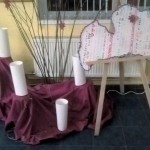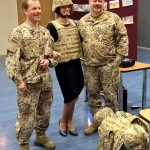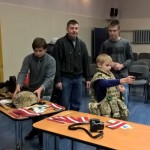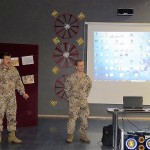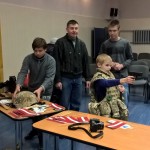Maltas to explore the work of unexploded munitions neutralizers at the centre of children and young people

“We are working and often forgetting that our efforts and skills are going to be our joy” – reminds the writer Paula Koeley, and this time this idea is perfect in the narrative of a piece of work that the breweries are delighted with each of their skilled effort and every return home, these are people who don't tend to do a banal saying that “mistakes are human”.
Patriotic Week - From Lāčplēsis Day to 18. November 10, with the experience and day-to-day familiarisation of participants in international peacekeeping missions, was launched at Maltas in the centre of children and young people, namely the meeting of the Latvian National Guard 2 nd Brigade 54. Civil engineering battalion unexploded munitions neutralisation rounds 3 rd Guard representatives: commander, retired supersleeper Ilmārs Apains, Headquarters Sergeant Uldis Adijans and sergeant Andrejs Ulass.
First OF ALL, Maltas BJC methodical children, young people and their parents were informed that BJC is hosting our national guardsmen whose daily life is linked to one of the most dangerous works – mine clearance, the neutralisation of unexploded ammunition. She also mentioned the fact that, on 23 August that year, the National Guard of the Republic of Latvia was 25 years of age and that in connection with this anniversary there is a book about Latgale national guardsmen, in which the co-author and editor are Maltas BJC journalist group teacher. It should be noted that Maltas AT the BJC National Festival Theme had the opportunity to look at around 20 different coloured photographs from the day-to-day events of these national guardsmen.
After that, Mr Apein informed MR Apein about the specificities and tasks of the unexploded munitions neutralizer, while the supersergeant AND the Adijani commented on the presentation and told him of the participation in the peacekeeping missions, provided information and statistical material on the calls, reminded him of what to do if a charge was found. But in particular, the persuasive and musical reflections of two over ten minutes of video films in which the former managed to see and hear the process of preparation and development of big explosions.
It is delighted that the boys, even though they did not ask a lot of questions, followed the narrative and the photomaterial nuances, and their true interest was also confirmed by the absence of the presentation immediately after the presentation, but by the active involvement of the special garments in which the boys (and not only!) were assisted by sergeant A. Ulass. It must be said that the very heavy outfit was also perfect for the former mothers who admitted that it was heavy not on the joke, but when they stood there for a moment, it became bearable, like everything in that life.
The time to show the boys, but there is no doubt that the information they have gained was new and educational. This was evidenced by the attention of both the eighth-year-old Arthur Colosov and the interest in asking about how many grenades had been found this year, and the opportunity for the first time to keep a real firearm and pride that he managed to hold 12 kilograms of heavy armour in his shoulders. I would only want this and other boys in the future with the word “soldier” not to take weapons in the hands, but only the mine of their own and foreign lands...
***
Lieutenant Ilmārs Apein: The National Guard entered the National Armed Forces in 1992. KB as a head of the head of the umbrella unit. Participated in three international peacekeeping missions: in 2003 in Kosovo, 2005 and 2006 in Afghanistan. Following a mission in Kosovo, where responsibilities were linked directly to the neutralisation of unexploded ammunition, it was understood that it was an area where it wished to operate. Work on the neutralisation of more than 6000 explosive objects has been conducted in Latvia and international operations. Received excellent attestation from the Commander of the Norwegian Armed Forces. In 2010, he was awarded the Order of the Viestura of Class V for a large personal contribution to the formation and development of the National Armed Forces and National Guard, a prestigious and self-sustaining service, participation in three international peacekeeping operations, a contribution to the education of young people.
Supersergeant Uldis Adijāns entered the National Guard in 1994 as a professional service soldier. Participated in three international peacekeeping missions, in 2006, 2008 and 2010 in Afghanistan. Becoming a specialists of unexploded munitions neutralisation (NMN) was helped by the coincidence of circumstances: a reorganisation in the National Guard battalions began in 2003, resulting in some of the posts being converted into others. It was during this time that THE NMN unit in Latgale began to form, where Uldis also joined and was one of the first creators of this unit. Honoured by THE NBS commander honorary mark “for destruction of explosive objects (600, 1000 and more)”, the National Armed Forces medal “for participation in the international operation in Afghanistan”, the SS commander's Grade 3 honorary mark “for service to the people and Latvia”, THE NBS Commander's memorial medal “for participation in international operations” No. 3, Grade 2 of THE ZS commander “for service to the people and Latvia”.
Sergeant Andrejs Ulass started his service IN NBS in 2000 as a professional service soldier. The National Guard was born in 2005. Participated in three international peacekeeping missions: in 2002 in Bosnia-Kosovo, Iraq in 2004 and 2006 in Afghanistan. As a specialist in the neutralisation of unexploded ammunition, the first peacekeeping mission in the Balkans, they often saw the work of Danish NMN specialists, had begun to understand the specifics of this work, which was very interested in him. Honoured by THE NBS commander honorary mark “for destruction of explosive items (600,1000 and more)”, the National Armed Forces memorial medal “for participation in international operations” No. 3, the SS Commander Grade 3 honorary sign “for the nation and Latvia”, 54. Ogre National Guard battalion “the importance of breasts”.
***
For information. ZS 54. Engineering battalion unexploded munitions neutralization sites — Saldus, Ogre and Rezekne. The Rēzekne conductor has a total of 31 provinces. Since 2005, NMN troops are carrying out tasks in international operations in Afghanistan. If 4578 different ammunition units were neutralised in 2006, there were 774 calls in 2014, 1341 calls were made in 2015 and 6433 different ammunition units were neutralised. The beauty of the calls also includes the cleaning of the landfill site, support for increased hazard classes, training, demilitarisation. If any unexploded ammunition is found, 112 or 110 should be reported.
Skaidrite Squicky,
Maltas BJC journalist group teacher
